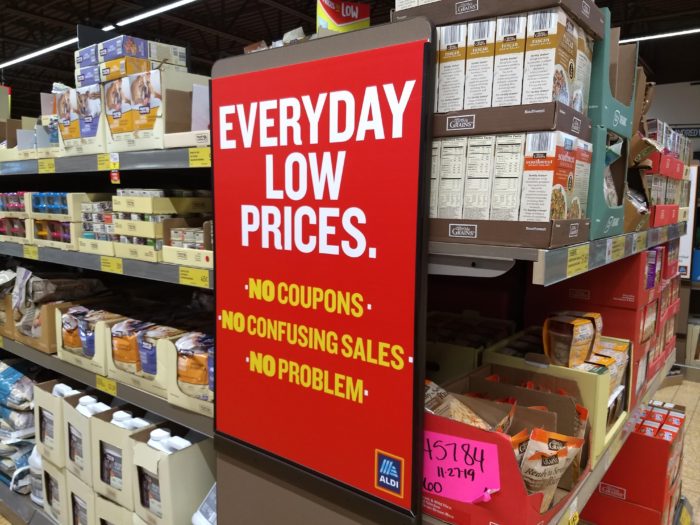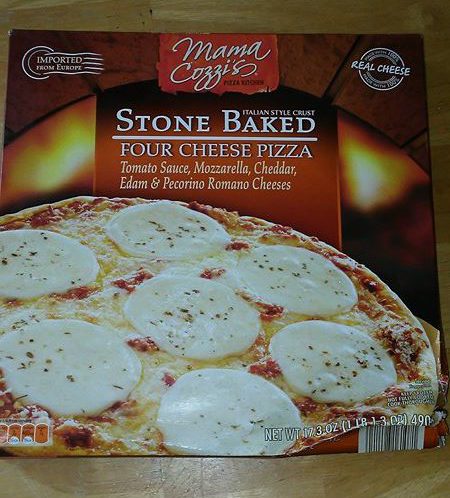How Aldi Benefits From Inflation
EDITOR’S NOTE: We realize that some people may have strong opinions about the subject of inflation, especially as it relates to politics. It is not our aim to get into those politics, but rather to talk about an issue that impacts Aldi shoppers in a real way. To that end, we ask commenters to be mindful of our community guidelines. We reserve the right to moderate comments, including those of a political nature.
Prices are on the rise everywhere these days, from the gas station to the real estate market to the grocery store. Consumers at the grocery store may be especially aware of inflation, which is driven primarily by strong domestic and global demand, labor shortages, and supply chain disruptions. Because the grocery store is a place people tend to frequent at least once a week, if not more often, it may be easier to notice when things such as frozen breaded chicken or even candles go up in cost. Grocers do what they can to avoid passing price increases on to customers, but many have no choice.
Inflation is a challenge for every store, especially when customers are used to certain prices. But some stores are in a position to manage it better than others.
Why Discount Stores are Well Positioned to Succeed
Costs are increasing at Aldi just as they are at all other grocery stores in the U.S. However, Aldi and other discount stores such as Walmart and Costco — and even dollar stores such as Dollar General and Dollar Tree — are uniquely positioned to potentially benefit from current economic conditions. That’s because discount stores such as Aldi, which have historically done well during other times of economic hardship, are already well known for offering good value for your dollar. They also have ways of offsetting or delaying rising prices.
When prices go up, shoppers look for the cheapest option. That option is often Aldi.
Plus, with Aldi opening a new distribution center and new stores in the American Southeast this year, the German supermarket is poised to attract even more budget-conscious shoppers. Aldi is so confident of its success that it’s willing to proceed with a large expansion plan in the midst of a bumpy economy. In a recent online discussion on RetailWire, some industry experts pointed out this is an ideal time for Aldi to open new stores in the United States. With shoppers looking for ways to cut their grocery budget — and with many people opting to cut costs by purchasing more private label or generic brands — Aldi is an obvious choice.
Why Aldi Stands Out
More than other discount grocers, Aldi offers a way to reduce spending while not necessarily feeling like you’re cutting corners, as long as you don’t mind bagging your own groceries and using a cart deposit system. Aldi products tend to be about as close to name-brand in terms of quality and taste as you can get, often being either equal to name brands or at the very least much better than other store brands.
Aldi also doesn’t focus on selling just the basics. It’s a store that has appeal for people who consider themselves foodies, with a good range of options that include organic food as well as cheese, seafood, international foods, and foods that cater to specific diets such as gluten free or keto.
In addition, shopping at Aldi comes with perks that other discount stores don’t have. Four words come to mind: the Aisle of Shame. Also known as the middle aisle, or the Aldi Find aisle, this section at Aldi sells an ever-changing array of new products each week, from gardening supplies to clothing to cookware. Aldi offers something different each time you go, making it a little bit like Christmas every week. In the midst of economic challenges, it’s hard not to appreciate how a small thing like finding the perfect deal on a pineapple slicer can boost morale.
Another key factor is the smaller size of Aldi stores. They offer quick in-and-out convenience without overwhelming customers with a huge array of brands and products all with different prices. If you need ketchup at Aldi, for instance, your only choice is between organic or regular. It’s a simple, low-stress experience.
Why Aldi is Likely to See Continued Growth
Combine all those factors — affordable groceries, good selection, a steady rotation of surprises, and convenient store sizes — and Aldi has a recipe for success no matter what the economy looks like. Aldi has been growing for decades even during times when the economy was less troubled, and Aldi has been beating other retailers at their own game for years.
And as some industry experts pointed out on RetailWire, once people discover Aldi, they don’t always go back to shopping at their previous grocery stores after their financial outlook improves. Shoppers often remain hooked on Aldi once they’ve tried it.
With that said, we will be watching with curiosity as Aldi expands this year, opening new stores in the Southeast and potentially gaining a lot of new loyal customers. We expect to see Aldi continue to be a formidable competitor to other established grocery chains.
In the meantime, you’ll find us where we often are, hunting down deals in the middle aisle.








The organic blueberries have already gone up in price, they’re now the same cost as the organic raspberries. Not ideal, but not terrible either as i see literally the exact same brand of organic blueberries on sale at shoprite for over 2 dollars more.
Arizona loves Aldi but they are in cities on the outskirts of Phoenix. We need at least some in Phoenix. We don’t get all the exciting Aldi specials like the gnomes. We have more and more people learning about Aldi but it is too far away for many. We hope we get more stores.
You’re right! The Phoenix Metropolitan area is well over 14,000 square miles. I used to live in Mesa and gradually limited the bulk of my shopping to Safeway and Target, because they were a mile and a half in opposite directions from my apartment. I never even heard of Aldi until I returned to Virginia and can no longer drive. Aldi is one of the few stores Instacart delivers for in my ZIP Code.
I am glad that Aldi is continuing with its plans to expand. It makes a lot of sense. Finally, we are poised to have a new Aldi in Rolla, MO, as our current store is the smallest I have seen, and the parking lot is too small. There is no ground around the building to expand the lot. They have broken ground. Hopefully, we will see a brand new building by August.
Sadly in my rural Oklahoma Aldi, it’s gotten to where most stuff is more expensive than Walmart. Might not be like that everywhere, but every time I go storewide prices have gone up $.05 to $1 on almost every single item. It really adds up when you have a really low grocery budget. I’m able to buy half as much food as I could a year and a half ago. Being diabetic, means my food costs more to begin with, and I’m struggling really hard.
Aldi, Dollar Tree, Dollar General and other discounters benefit from economic hard times in general, not specifically inflation. But Aldi is unique in that they have shown an ability to adjust to both good times and bad. When consumers have less spending power, Aldi can hunker down on cheap staples like cereal, milk and produce. When times improve and wallets are looser, Aldi adds affordable luxury items (candles, imported foods, etc) to its product mix.